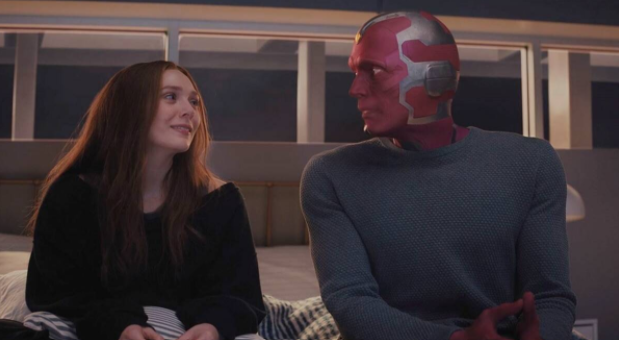Spoiler Alert: This review will contain spoilers for all nine episodes of “WandaVision.”
I felt a rush of sweet familiarity wash over me when the Marvel Studios logo danced onto the screen. A year and a half passed without any Marvel films. I needed some superhero fun after the mess that was 2020, and “WandaVision” delivered that and much more.
After 23 films in the franchise, Marvel has earned the right to take a huge risk here. What they gave the audience was a profound and impactful case study in the grieving process.
The series focuses on Wanda Maximoff (Elizabeth Olsen), a character that has done nothing but suffer her whole life. Her suffering is only amplified when she joins the Avengers.
The one bright spot in her life was her relationship with her android lover Vision (Paul Bettany), but his death has just left Wanda to wallow in her grief. In a moment of sadness, Wanda’s powers explode from within, trapping an entire town and forcing them to play through different decades of sitcoms and alongside a faux Vision.
Wanda and Vision jump from one decade’s style of a sitcom to the next with each episode. The duo travels from the 1950s style, in an “I Love Lucy-esque” show, all the way to the 2000s with a riff on “Modern Family.” The concept is so much fun and Marvel commits to the bit wholeheartedly.
Olsen and Bettany also get the chance to flex their acting chops with each episode. The two performers get a chance to break away from the usual superhero acting and have a blast adapting to the tropes of each new sitcom variant. Whenever the two need to sell the emotional moments, they do so with ease.
Bettany kills it as Vision and shows us a more vulnerable side to him, but Olsen’s performance entranced me. This is her story, after all. It is her immense grief that the audience is bearing witness to.
Throughout the nearly six-hour run time, the writers take the viewers through the five stages of grief: denial, anger, bargaining, depression and acceptance.
The first two episodes encapsulate denial very well, as Wanda plays through the sitcom charade as if nothing is wrong. When oddities start occurring, she simply moves on without a second thought or changes reality to fit what she thinks should happen.
The next set of episodes focus on anger. The real world starts to creep its way into Wanda’s fabricated reality and she has some issues with that. With the mention of the mechanized terror known as Ultron, Wanda’s façade breaks and sends undercover SWORD Agent Monica Rambeau (Teyonah Parris) hurtling across town.
Wanda enters the bargaining phase when Vision attempts to leave the boundaries of her constructed reality. This phase is when one attempts to regain control over the situation. Things have started to unravel. With Vision leaving, she expands the boundaries of her created world, trapping even more people in her power.
She moves into the depression stage after that, where she refuses to do anything productive and claims life has no meaning.
Wanda falls deeper down the depression hole when the antagonist Agatha Harkness (Kathryn Hahn) reveals herself and makes her relive the most traumatic moments in her life. The audience sees her as a child watching sitcoms with her family, revealing that those shows were a source of comfort for her. That moment ruptures when a bomb bearing Tony Stark’s name drops into her living room, killing her parents. The memories move to Wanda getting her powers from the Mind Stone, then to an incredibly moving scene at the start of her and Vision’s relationship.
Wanda moves into the acceptance phase in the final episode, where she must leave Vision in a heartbreaking goodbye and accept that he is gone. The writers really pull off an incredible feat with this show.
“WandaVision” falls into the trap of setting some things up only to have it resolved in other media further down the line. It introduces Pietro, the silver speedster from the Fox’s “X-Men” universe, only to use him as a joke about male genitals.
At the end of the day, this show accomplished what it set out to do. It added depth to characters that had not received as much screen time as others like Captain America or Iron Man. Through incredible performances and engaging writing, it told the story of a woman working through her grief after having lost everything and will remain as one of the more moving narratives in the Marvel Universe.
cbskbf@mail.umkc.edu








